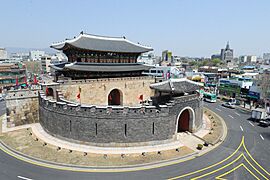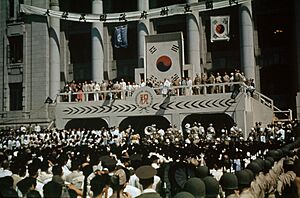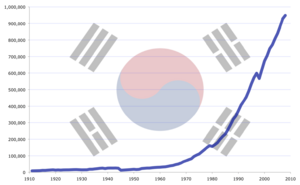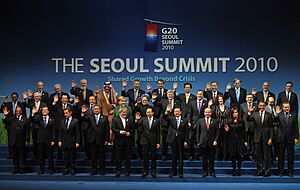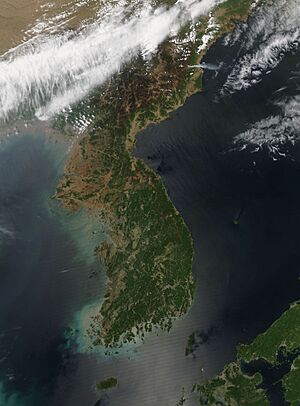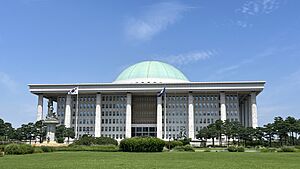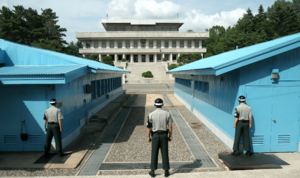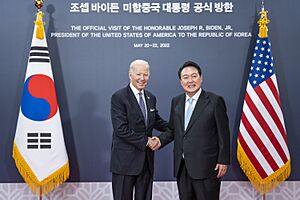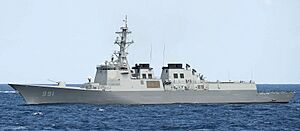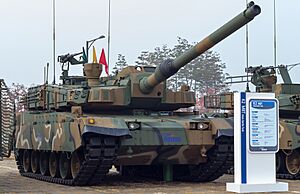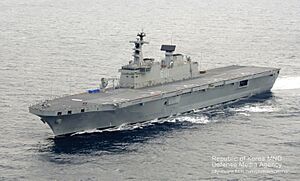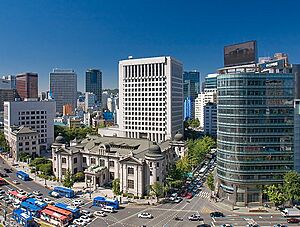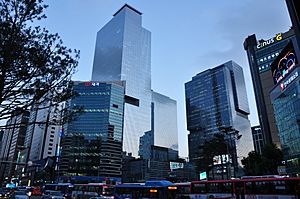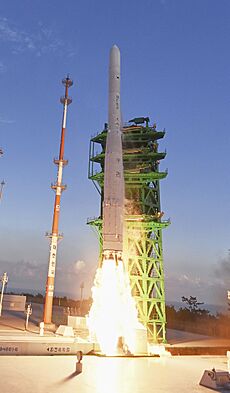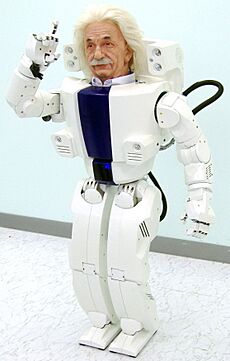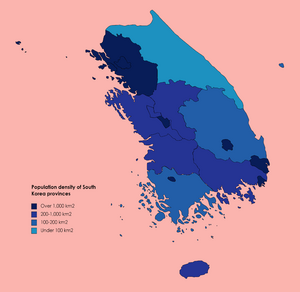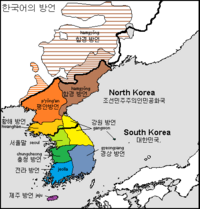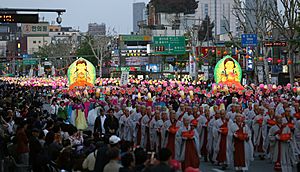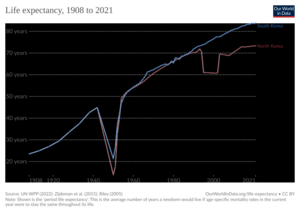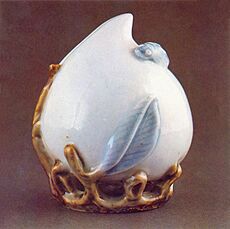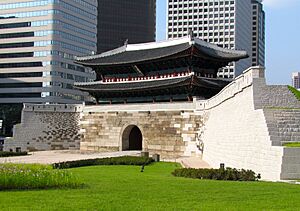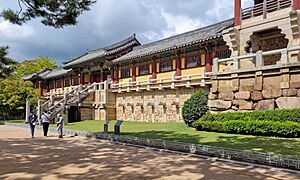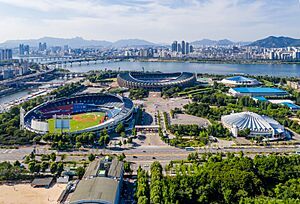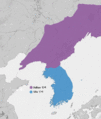South Korea facts for kids
Quick facts for kids
Republic of Korea
|
|
|---|---|
|
|
|
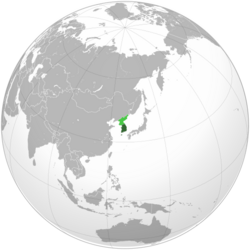
South Korea North Korea (claimed but not controlled)
|
|
| Capital and largest city
|
Seoul 37°33′N 126°58′E / 37.550°N 126.967°E |
| Official languages | Korean (Pyojuneo) Korean Sign Language |
| Official script | Hangul |
| Ethnic groups
(2024)
|
|
| Religion
(2024)
|
|
| Demonym(s) |
|
| Government | Unitary presidential republic |
| Lee Jae Myung | |
| Kim Min-seok | |
|
• Speaker of the National Assembly
|
Woo Won-shik |
| Legislature | National Assembly |
| Establishment history | |
|
• Gojoseon
|
October 3, 2333 BCE (mythological) |
| 57 BC | |
| 668 | |
|
• Goryeo dynasty
|
July 25, 918 |
|
• Joseon dynasty
|
August 13, 1392 |
| October 12, 1897 | |
| August 29, 1910 | |
|
• Independence from Japan declared
|
March 1, 1919 |
|
• Provisional Government
|
April 11, 1919 |
| August 15, 1945 | |
|
• US administration of Korea south of the 38th parallel
|
September 8, 1945 |
|
• ROK established
|
August 15, 1948 |
| February 25, 1988 | |
| Area | |
|
• Excl. North Korea
|
100,363 km2 (38,750 sq mi) (107th) |
|
• Water (%)
|
0.3 |
| Population | |
|
• 2024 estimate
|
|
|
• Density
|
507/km2 (1,313.1/sq mi) (27th) |
| GDP (PPP) | 2025 estimate |
|
• Total
|
|
|
• Per capita
|
|
| GDP (nominal) | 2025 estimate |
|
• Total
|
|
|
• Per capita
|
|
| Gini (2021) | ▼ 33.3 medium |
| HDI (2023) | very high · 20th |
| Currency | Korean Republic won (₩) (KRW) |
| Time zone | UTC+9 (Korea Standard Time) |
| Date format |
|
| Driving side | right |
| Calling code | +82 |
| ISO 3166 code | KR |
| Internet TLD | |
South Korea, officially known as the Republic of Korea (ROK), is a country in East Asia. It makes up the southern part of the Korean Peninsula. To its north is North Korea, separated by the Korean Demilitarized Zone. The Yellow Sea is to its west, and the Sea of Japan is to its east.
South Korea has a population of about 52 million people. Half of them live in the Seoul Metropolitan Area, which is one of the largest city areas in the world. Other big cities include Busan, Daegu, and Incheon.
The Korean Peninsula has been home to people since ancient times. Its first kingdom was mentioned in Chinese records around 700 BC. Over time, different groups formed kingdoms like Goguryeo, Baekje, and Silla. Silla later united most of the peninsula in the late 600s AD.
The Goryeo dynasty (918–1392) brought lasting unity and shaped what it means to be Korean today. The Joseon dynasty (1392–1897) followed, a time of great cultural, economic, and scientific progress. After this, the Korean Empire (1897–1910) tried to modernize but was taken over by Japan in 1910.
Japanese rule ended after World War II. Korea was then divided into two parts: a northern zone occupied by the Soviet Union and a southern zone occupied by the United States. When talks to reunite Korea failed, the southern zone became the Republic of Korea in August 1948. The northern zone became North Korea a month later.
In 1950, North Korea invaded South Korea, starting the Korean War. This war lasted until 1953 and caused many deaths and destroyed the economy. South Korea then went through a period of different governments, but its economy grew very quickly. This amazing growth is often called the "Miracle on the Han River". In 1987, the country became a full democracy.
Today, South Korea is a highly developed country. Its economy is one of the largest in the world. It is known for its strong education system, high human development, and advanced technology. South Koreans enjoy a long life expectancy and very fast internet. Since the early 2000s, South Korea's pop culture, like K-pop music and TV shows, has become famous worldwide. This is known as the Korean Wave.
Contents
What Does "Korea" Mean?
The name Korea comes from the old Korean kingdom called Goryeo. This name was used by Goguryeo in the 400s and later by the Goryeo state in the 900s. Traders from Arab and Persian countries pronounced it as "Korea."
After the Goryeo kingdom, the Joseon dynasty (1392–1897) became the official name for the whole country. In 1897, the Joseon dynasty changed the country's name to the Korean Empire. The name Daehan from the Korean Empire comes from Samhan, which refers to the Three Kingdoms of Korea.
After Japan surrendered in 1945, the name "Republic of Korea" was chosen for the new country. In Korean, this is Daehan Minguk.
A Look at Korea's Past
Early History of Korea
The Korean Peninsula has been lived on since the Lower Paleolithic period. The story of Korea often begins with the founding of Gojoseon in 2333 BC by the legendary Dangun. Gojoseon grew to control the northern Korean Peninsula and parts of Manchuria.
Later, around 300 BC, people from the Korean Peninsula moved to the Japanese islands. Around the same time, early Koreans arrived in the southern part of the peninsula.
The Three Kingdoms Era
During the Proto–Three Kingdoms period, states like Buyeo, Okjeo, Dongye, and Samhan existed. From these, the Three Kingdoms of Korea grew: Goguryeo, Baekje, and Silla.
Goguryeo was the largest and strongest. It was a military power and fought against Chinese dynasties for 700 years. Under leaders like Gwanggaeto the Great, Goguryeo became very powerful. Baekje was strong at sea and helped spread Buddhism to Japan. Silla was the smallest but used smart alliances to its advantage.
In 676, Silla united the Three Kingdoms. This led to the Northern and Southern States period, where Balhae controlled the north and Silla controlled most of the south. Balhae was founded by a Goguryeo general and was known as the "Prosperous Country in the East."
Later Silla was a rich country with a thriving culture. It had famous monuments like Seokguram and the Bell of King Seongdeok. Buddhism was very important during this time.
Unified Dynasties: Goryeo and Joseon
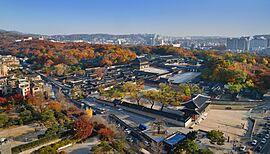
In 936, the kingdoms were united by Wang Geon, who started the Goryeo dynasty. Goryeo was a very cultural state. It invented the metal movable type printing press, which was a huge step for spreading knowledge. After fighting off the Khitan Empire, Goryeo had a golden age for about a century.
However, Mongol invasions in the 1200s weakened Goryeo. Though not fully conquered, Goryeo became a close ally of the Mongols for many years. In 1392, General Yi Seong-gye started the Joseon dynasty.
The Joseon dynasty brought peace and progress in science and education. Sejong the Great created Hangul, the Korean alphabet, to help everyone learn to read and write. Between 1592 and 1598, Japan invaded Korea, but Korean forces, led by Admiral Yi Sun-sin and his famous "turtle ship", fought them off. After this, Joseon had nearly 200 years of peace.
In the 1800s, Joseon faced economic problems and uprisings. The government became weak, and its strict policy of isolationism (being a "hermit kingdom") became harder to maintain as other countries like Japan, Russia, and the United States became more involved in the region.
Japanese Rule and World War II
In the late 1800s, Japan became a strong power. In 1897, Korea's last king, Gojong, declared the Korean Empire. But Japan forced Korea to become its protectorate in 1905 and then officially took it over in 1910. This period was difficult for Koreans, as their language and culture were suppressed. This led to protests like the March First Movement in 1919 and the formation of resistance groups.
Towards the end of World War II, the U.S. and the Soviet Union decided to divide Korea into two zones for occupation. The U.S. took the southern part, and the Soviets took the northern part.
The Division of Korea and the Korean War
In 1948, Korea was divided into two separate countries: North Korea and South Korea. In the South, Syngman Rhee became the first president. In the North, Kim Il Sung became the leader. Both leaders wanted to control the whole peninsula.
On June 25, 1950, North Korea invaded South Korea, starting the Korean War. This was a major conflict during the Cold War. The United Nations Command, led by the U.S., supported South Korea, while the Soviet Union and China supported North Korea. The war ended in 1953 with an armistice, which is a ceasefire, but no peace treaty was ever signed. This means the two Koreas are still technically at war. The war caused about 3 million deaths and destroyed most of Korea's major cities.
South Korea's Economic Growth
After the war, South Korea faced political challenges. In 1960, student protests led to the president's resignation. In 1961, General Park Chung Hee took power. Under his leadership, South Korea's economy grew very fast, focusing on exports. This period of rapid economic growth is known as the "Miracle on the Han River." Park's rule ended in 1979.
The years after were marked by more political changes. In 1987, large protests called the June Democratic Struggle led to the end of authoritarian rule. This brought about direct elections for the president.
Modern South Korea
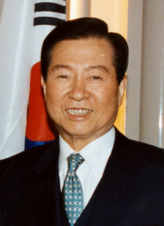
In 1987, Roh Tae-woo won the presidential election. Seoul hosted the 1988 Summer Olympics in 1988, which helped boost South Korea's global image. South Korea officially joined the United Nations in 1991.
In 1997, Kim Dae-jung was elected president. He worked to improve relations with North Korea through his "Sunshine Policy." In 2000, he received the Nobel Peace Prize for his efforts. South Korea also co-hosted the 2002 FIFA World Cup with Japan.
In 2010, there were some attacks from North Korea, including the sinking of a South Korean warship. These events caused tension.
In 2012, Park Geun-hye became South Korea's first female president. However, she was later removed from office in 2017 due to a political scandal. Moon Jae-in then became president. His time in office saw improved relations with North Korea and the successful hosting of the 2018 Winter Olympics in Pyeongchang.
The COVID-19 pandemic affected the country starting in 2020. In 2020, South Korea's population decreased for the first time, as there were more deaths than births.
In March 2022, Yoon Suk Yeol won the presidential election. However, he was removed from office in April 2025. Lee Jae-myung won the election to succeed Yoon and became president in June 2025.
South Korea's Land and Weather
Geography of South Korea
South Korea is located on the southern part of the Korean Peninsula. This peninsula stretches about 1,100 kilometers (680 miles) from the Asian mainland. The Yellow Sea is to its west, and the Sea of Japan is to its east. The country's total area is about 100,410 square kilometers (38,770 square miles).
South Korea has four main regions:
- An eastern region with high mountains and narrow coastal plains.
- A western region with wide coastal plains and river areas.
- A southwestern region with mountains and valleys.
- A southeastern region dominated by the Nakdong River.
Most of South Korea is mountainous, and only about 30% of the land is flat. The country has 20 national parks and beautiful natural places like the Boseong Tea Fields.
About 3,000 islands, mostly small and uninhabited, are off South Korea's western and southern coasts. Jeju Province is the largest island, located about 100 kilometers (62 miles) off the southern coast. It is home to Hallasan, a dormant volcano and South Korea's highest point, reaching 1,950 meters (6,398 feet) above sea level.
South Korea's Climate
| Weather chart for Seoul | |||||||||||||||||||||||||||||||||||||||||||||||
|---|---|---|---|---|---|---|---|---|---|---|---|---|---|---|---|---|---|---|---|---|---|---|---|---|---|---|---|---|---|---|---|---|---|---|---|---|---|---|---|---|---|---|---|---|---|---|---|
| J | F | M | A | M | J | J | A | S | O | N | D | ||||||||||||||||||||||||||||||||||||
|
22
2
-6
|
24
4
-4
|
46
10
1
|
77
18
7
|
102
23
13
|
133
27
18
|
328
29
22
|
348
30
22
|
138
26
17
|
49
20
10
|
53
12
3
|
25
4
-3
|
||||||||||||||||||||||||||||||||||||
| temperatures in °C precipitation totals in mm |
|||||||||||||||||||||||||||||||||||||||||||||||
|
Imperial conversion
|
|||||||||||||||||||||||||||||||||||||||||||||||
South Korea has four distinct seasons: spring, summer, autumn, and winter. Spring is from late March to early May, summer from mid-May to early September, autumn from mid-September to early November, and winter from mid-November to mid-March.
The country has a humid climate, with heavy rain in summer during a short rainy season called jangma. In Seoul, the average temperature in January is between -7°C and 1°C (19-34°F), and in August, it's between 22°C and 30°C (72-86°F). Summer can be very hot and humid. Typhoons sometimes hit the southern coast in late summer, bringing strong winds and heavy rains.
Protecting the Environment
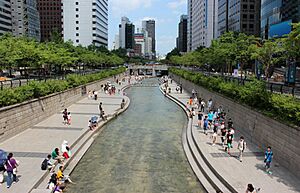
In the past, South Korea's rapid growth didn't focus much on the environment. But now, there are efforts to balance growth with nature. The government has a large "green growth" project to improve energy efficiency and green technology.
Seoul's tap water is now safe to drink, and the city calls it "Arisu." There have also been projects to plant more trees. A big project was restoring Cheonggyecheon, a stream in downtown Seoul that was once covered by a highway. Air quality is still a challenge, partly due to pollution from nearby countries.
How South Korea is Governed
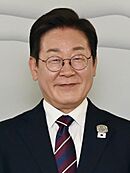 |
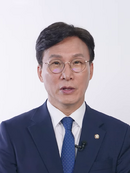 |
| Lee Jae-myung President |
Kim Min-seok Prime Minister |
South Korea is a constitutional democracy. Its government is set up by the Constitution of the Republic of Korea. Like many democracies, it has three main parts:
- The executive branch (led by the President)
- The judicial branch (courts)
- The legislative branch (the National Assembly)
The constitution has been changed several times since 1948. South Korea has a presidential system, meaning the president is the main leader. After a period of military rule, South Korea became a successful liberal democracy. Today, it is considered a "full democracy."
How South Korea is Divided
South Korea is divided into different areas for easier management. These include:
- Provinces
- Special self-governing provinces
- Metropolitan cities (large self-governing cities)
- One special metropolitan city (Seoul)
- One special self-governing city (Sejong)
South Korea's Relationships with Other Countries
Foreign Relations
South Korea joined the United Nations in 1991. Ban Ki-moon, a former South Korean Foreign Minister, served as the UN Secretary-General from 2007 to 2016. South Korea is also a member of important international groups like the G20. In 2010, South Korea hosted the G-20 Summit in Seoul. It has also signed free trade agreements with many countries, including the European Union, Canada, Australia, and New Zealand.
Relations with North Korea
Both North and South Korea claim to be the rightful government of the entire peninsula. Despite their disagreements, there have been efforts to bring them closer. In 2007, South Korean President Roh Moo-Hyun and North Korean leader Kim Jong Il signed an agreement to work towards peace and cooperation.
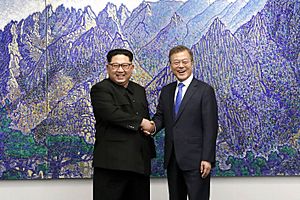
However, North Korea's missile tests have often made relations tense. North and South Korea are still technically at war because no peace treaty was signed after the Korean War. They share the world's most heavily guarded border.
Relations with China and Russia
Historically, Korea had close ties with Chinese dynasties. In modern times, after World War II, China became communist, while South Korea allied with the United States. China supported North Korea during the Korean War, which stopped relations between South Korea and China for a long time.
However, relations slowly improved, and South Korea and China officially re-established diplomatic ties in 1992. China is now South Korea's largest trading partner.
After the Korean War, the Soviet Union had strong ties with North Korea, so there was little contact with South Korea. Since the 1990s, after the Soviet Union dissolved, trade and cooperation between South Korea and Russia have grown.
Relations with Japan
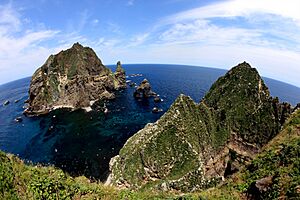
Korea and Japan have a long and complex history. Japan's 35-year rule over Korea in the 20th century is seen very negatively in South Korea. Formal diplomatic ties between South Korea and Japan were established in 1965. Japan is now South Korea's third-largest trading partner.
However, disagreements continue over historical issues, such as how Japanese textbooks describe past events, and a territorial dispute over the Liancourt Rocks.
Relations with the United States
South Korea and the United States have had a close relationship since World War II. U.S. forces helped defend South Korea during the Korean War. After the war, they signed a "Mutual Defense Treaty," meaning they would help each other if attacked.
The two countries have strong economic, diplomatic, and military ties. The U.S. is South Korea's second-largest trading partner. A free trade agreement between them took effect in 2012.
South Korea's Military
Because of ongoing tensions with North Korea, South Korea spends a lot on its military. It has one of the largest and strongest armed forces in the world. All South Korean men are required to serve in the military, usually for 18 months.
South Korea's military includes the Army, Navy, Air Force, and Marine Corps. Many forces are located near the Korean Demilitarized Zone. South Korea has also sent troops overseas to help in conflicts, such as the Vietnam War and the war in Iraq.
There are also about 28,500 U.S. military personnel stationed in South Korea. They are part of the United States Forces Korea.
South Korea's Economy
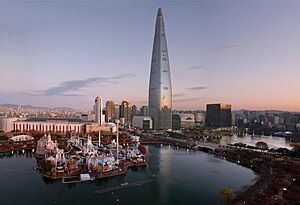
South Korea has a strong and advanced economy, ranking among the top countries in the world by GDP. It is a developed country and a member of the G20 major economies. Famous South Korean brands like LG Electronics and Samsung are known worldwide for their quality electronics.
South Korea has invested a lot in education, which has helped its economy grow rapidly. It has a highly skilled workforce, and many citizens have a university degree. From the 1960s to the 1990s, South Korea's economy was one of the fastest-growing in the world. This growth is called the "Miracle on the Han River."
The South Korean economy relies heavily on international trade. It is one of the world's largest exporters and importers. The country also has one of the largest foreign currency reserves.
Even during global economic crises, South Korea's economy has shown strength. It recovered quickly from the 1997 Asian financial crisis and avoided a recession during the 2008 financial crisis.
Transportation in South Korea
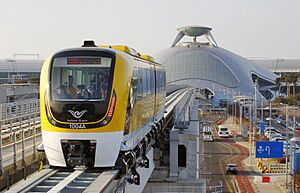
South Korea has a very modern transportation system. It includes high-speed railways, highways, bus routes, ferry services, and air routes. The KTX high-speed rail system connects major cities. Many large cities also have subway systems.
Incheon International Airport is the main international airport, serving millions of passengers each year. Other international airports are in Gimpo, Busan, and Jeju. Major airlines like Korean Air and Asiana Airlines offer both domestic and international flights.
Energy in South Korea
South Korea is a major producer of nuclear power, which provides about 45% of its electricity. The country is also developing advanced nuclear reactors and technologies.
South Korea is becoming a global exporter of nuclear reactors. It has agreements with countries like the United Arab Emirates to build and maintain nuclear power plants.
Tourism in South Korea
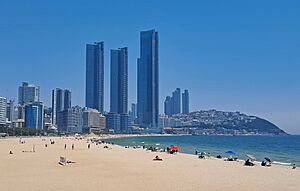
In 2019, over 17 million foreign tourists visited South Korea. A big reason for this is the popularity of Korean pop culture, like K-pop music and TV shows, known as the Korean Wave. This cultural phenomenon has made South Korea a major influence in East Asia and beyond.
The Korean Wave has also encouraged foreign investment in South Korea, especially in its service industries.
Science and Technology in South Korea
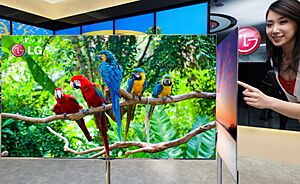
South Korea has focused heavily on technology since its industrial growth in the 1960s. It leads many countries in the number of science and engineering graduates. From 2014 to 2019, it was ranked as one of the most innovative countries in the world.
South Korea is known for its advanced mobile market and fast internet. This allows for new types of media and apps to be developed. The country invests a lot in research and development, ranking second globally in spending as a percentage of its GDP.
Aerospace Engineering
South Korea has launched several satellites since 1992. In April 2008, Yi So-yeon became the first Korean to fly in space.
In 2009, South Korea's first spaceport, Naro Space Center, was completed. In January 2013, the launch of Naro-1 was successful. On October 21, 2021, the KSLV-2 Nuri rocket was successfully launched, showing South Korea's own space technology.
Robotics
Robotics has been a key research area in South Korea since 2003. In 2005, KAIST developed HUBO, the world's second walking humanoid robot. In 2006, the first Korean android, EveR-1, was created.
There are plans to use English-teaching robot assistants in schools. Robotics is also used in entertainment, with events like the Korean Robot Game Festival.
Biotechnology
Since the 1980s, South Korea has invested in biotechnology. This includes making vaccines and antibiotics. Research in genetics and cloning has also grown. For example, the first dog was successfully cloned in 2005.
Since late 2020, SK Bioscience Inc. has been producing a large amount of the Oxford–AstraZeneca COVID-19 vaccine for global distribution.
People and Culture of South Korea
Population and Demographics
In 2022, South Korea had about 51.7 million people. The population more than doubled from 1955 to 2010. However, the birth rate has been falling rapidly since 1960. In 2020, the country recorded more deaths than births for the first time.
By 2023, the fertility rate was 0.72 children per woman, which is the lowest in the world. This means the working-age population is shrinking. The government has called the low birth rate a "national emergency" and is offering incentives to encourage families to have children.
Most South Koreans live in cities. About half the population lives in the Seoul Metropolitan Area. Other major cities include Busan, Incheon, and Daegu. South Korea has a very high population density.
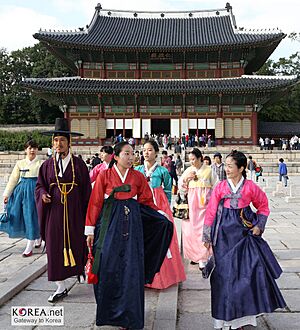
The population has also been shaped by people moving in and out of the country. After World War II, about four million people moved from North Korea to South Korea. Many ethnic Koreans also live overseas.
South Korea is mostly made up of ethnic Koreans, who make up about 96% of the population. However, the number of foreign residents has been growing quickly, especially foreign workers and international students.
Life expectancy in South Korea has risen sharply. In 2024, it was 83.53 years, one of the highest in the world.
Language in South Korea
Korean is the official language of South Korea. Most linguists consider it a unique language, not related to others. Korean uses its own writing system called Hangul. King Sejong created Hangul in 1446 to make reading and writing easier for everyone. South Korea still uses some Chinese characters (Hanja) in certain areas, like newspapers.
The standard Korean dialect in South Korea is the Seoul dialect. Almost all South Korean students learn English in school today.
Religion in South Korea
Religion in South Korea (2024) Irreligious (51%) Protestantism (20%) Catholicism (11%) Korean Buddhism (17%) Other (2%)
According to a 2024 survey, more than half of South Koreans (51%) do not belong to any organized religion. Of those who do, most are Christians or Buddhists. About 31% of the population are Christians (20% Protestant, 11% Catholic), and 17% are Buddhists. Other religions include Islam and various local religions.
Christianity is the largest organized religion in South Korea. It grew significantly in Korea starting in the 1700s. During Japanese rule, Christianity became linked with Korean nationalism.
Buddhism was introduced to Korea in the 300s. It became a major religion in the Silla kingdom and later in Goryeo. Many of South Korea's National Treasures are Buddhist artifacts.
Education in South Korea
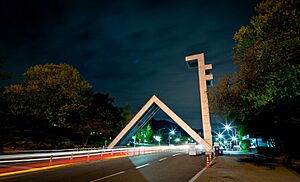
South Korea has a centralized education system from kindergarten to high school. The school year has two semesters. The country has a strong focus on education, often called "education fever." This passion for learning has helped South Korea grow its economy rapidly.
South Korea ranks very high in global education surveys, especially in math and science. Higher education is very important in South Korean society, as it is seen as a key to success and improving one's life.
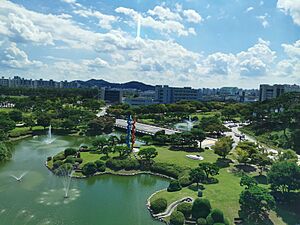
In 2015, South Korea spent 5.1% of its GDP on education, which is higher than the average for developed countries.
Health in South Korea
South Korea has a universal health care system. In 2021, it was ranked as having one of the best healthcare systems in the world. South Korean hospitals have advanced medical equipment.
Life expectancy has been rising quickly, and South Korea ranks among the top countries for life expectancy.
South Korean Culture
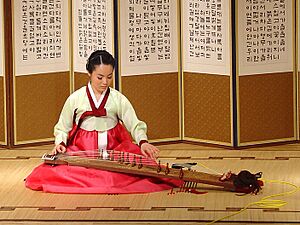
South Korea shares its traditional culture with North Korea. However, since the peninsula was divided, they have developed different modern cultures. Korean culture has been influenced by China but has also developed its own unique identity. South Korea has many UNESCO Intangible Cultural Heritages and World Heritage Sites.
Modern Korean life has changed a lot due to industrialization and city growth. Many families now live in smaller, nuclear family units instead of large multi-generational households.
Art in South Korea
Korean art has been greatly influenced by Buddhism and Confucianism. This can be seen in traditional paintings, sculptures, and ceramics. Korean pottery and porcelain, like Joseon's baekja and Goryeo's celadon, are famous worldwide. Traditional performing arts include the Korean tea ceremony and pansori.
Modern Korean art began to grow in the 1960s and 1970s, focusing on shapes and abstract ideas. Later, social issues became common themes. International events and exhibits have brought more variety to Korean art.
Architecture in South Korea
South Korea's history has led to a mix of architectural styles. Traditional Korean architecture blends with nature. Old buildings often have thatched roofs and heated floors called ondol. You can see traditional architecture in palaces, temples, and old houses called hanok. Many UNESCO World Heritage Sites also show traditional architecture.
Western architecture arrived in the late 1800s. After the Korean War, modern Korean architecture developed, mixing traditional ideas with new styles. Since the 1988 Seoul Olympics, there has been a wide variety of architectural designs.
Entertainment in South Korea

South Korea has a very successful entertainment industry. Its TV dramas, films, and popular music are famous worldwide. This cultural phenomenon is known as Hallyu or the "Korean Wave." It has made South Korea a major exporter of popular culture.

Before the 1990s, traditional folk music was popular. But the pop group Seo Taiji and Boys changed South Korean popular music, known as K-pop. K-pop mixes many different music styles from around the world. K-pop idols are famous across Asia and have gained fans in Western countries. Many K-pop groups use online platforms like YouTube to reach a global audience. Singer Psy's song "Gangnam Style" became a global hit in 2012.
The Korean film industry has grown a lot since the movie Shiri in 1999. Korean films are very popular in South Korea. The 2019 film Parasite, directed by Bong Joon-ho, won many awards, including Best Picture at the Academy Awards.
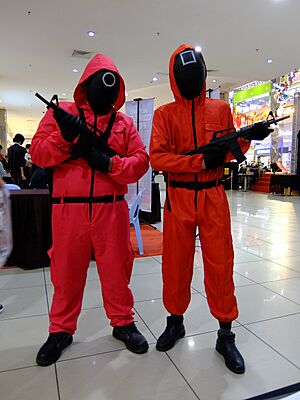
South Korean TV shows, called K-dramas, are also very popular internationally. Many K-dramas focus on romance or historical stories. The 2021 survival drama Squid Game became one of Netflix's most-watched series worldwide.
Holidays in South Korea
South Korea celebrates several public holidays. The Korean New Year, or "Seollal," is celebrated on the first day of the Korean calendar. Korean Independence Day is on March 1. National Liberation Day of Korea on August 15 celebrates Korea's freedom from Japan in 1945.
Every 15th day of the 8th lunar month, Koreans celebrate the Midautumn Festival. On this day, Koreans visit their hometowns and eat traditional foods. Hangul Day on October 9 celebrates the invention of the Korean alphabet.
Cuisine in South Korea
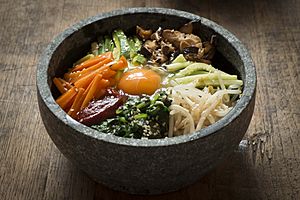
Korean cuisine, called hanguk yori or hansik, has changed over centuries. Dishes vary by region. Traditional meals are known for many side dishes, called banchan, served with rice. Kimchi, a spicy fermented vegetable dish, is very common.
Korean food often uses sesame oil, doenjang (fermented soybean paste), soy sauce, garlic, ginger, and gochujang (hot pepper paste). Other famous dishes include bulgogi (grilled marinated beef) and tteokbokki (spicy rice cakes).
Soups like guk and stews like jjigae are also common parts of a meal. Popular Korean alcoholic drinks include Soju and Makgeolli. Koreans uniquely use metal chopsticks.
Sports in South Korea
The martial art taekwondo started in Korea. It became an official Olympic sport in 2000. Other Korean martial arts include Taekkyon and hapkido.
Football and baseball are the most popular sports in Korea. The national football team reached the FIFA World Cup semi-finals in 2002, which South Korea co-hosted with Japan. They have qualified for every World Cup since 1986.
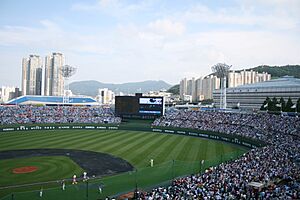
Baseball was introduced to Korea in 1905. The Korea Professional Baseball league started in 1982. The national team has done well in international tournaments, winning gold in the 2008 Summer Olympics.
Basketball is also popular. The Korea national basketball team has won many medals in Asian championships.
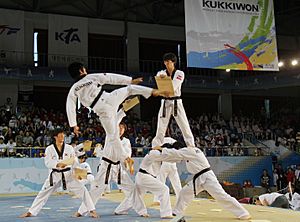
South Korea has hosted the Asian Games three times. It also hosted the 1988 Summer Olympics in Seoul. South Korea often wins many medals in sports like archery, shooting, table tennis, and short track speed skating.
Pyeongchang hosted the 2018 Winter Olympics. South Korea has won more medals in the Winter Olympics than any other Asian country, especially in short track speed skating.
Competitive video gaming, known as esports, has become very popular in South Korea, especially among young people. Popular games include League of Legends and StarCraft.
Images for kids
-
Seokguram Grotto from the Silla era, a UNESCO World Heritage Site
-
Balhae (violet) and Silla (blue), circa 830 AD
-
The oldest surviving metal movable type book, the Jikji, printed in 1377.
See also
 In Spanish: Corea del Sur para niños
In Spanish: Corea del Sur para niños
 | James Van Der Zee |
 | Alma Thomas |
 | Ellis Wilson |
 | Margaret Taylor-Burroughs |





